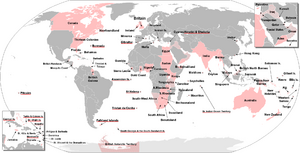Third British Empire (political theory)

The Third British Empire is a political philosophy that theorizes a revival of the British Empire through micronations, secessionist movements, or simply individual citizens of former British territories that choose to remain loyal to the Crown.
The theory has its roots in the Dominion of Vancouver Island, and is believed to have first been promulgated by Canadian micronationalists Dustin Carlson and Lucas Gonyer.
Historical basis
Many historians agree that the history of the British Empire can be broken down into two periods of peak global influence: the "first empire" that existed between 1583 and 1783, and the "second empire" from 1783 to the handover of Hong Kong in 1997, although some experts argue that the empire was already in terminal decline after the conclusion of World War II in 1945. Decolonization led to many territories under British rule declaring their independence throughout the 20th century, leaving only the Crown Dependencies and British Overseas Territories remaining under the direct jurisdiction of the United Kingdom, while the 15 Commonwealth realms share a common monarch but are otherwise completely independent from the United Kingdom and each other. The Third British Empire theory advocates the creation and future expansion of a "third empire" to carry on its imperial legacy.
Concepts
The main concept of the third British Empire theory is to rebuild an "empire on which the sun never sets" through the creation of micronations and other self-proclaimed independence movements. Although tiny by comparison and lacking international recognition, this movement would allow the British Empire, at least in theory, to continue its existence in the 21st century.
Impact in the micronational community
The Dominion of Vancouver Island and the Dominion of British West Florida are both known to support the concept of a British Empire that still exists and still possesses the capacity to exert influence in modern geopolitical politics. British colonial influence can be seen in many "dominion-themed" micronations such as the Dominion of British North America, Commonwealth of Rhodesia, and New Ulster, although these nation have never explicitly cited the third British Empire theory as an inspiration or guiding ideology. Nevertheless, a desire to preserve the legitimacy of the Crown and a common British political and cultural heritage can be seen in many micronations, as well as intermicronational organizations like the Commonwealth of British Dominions.